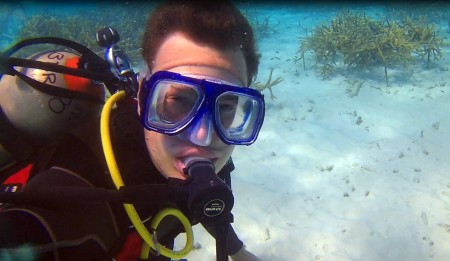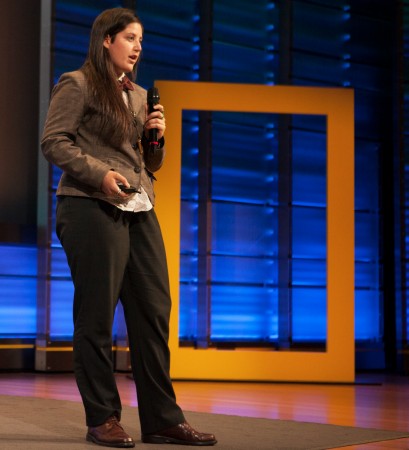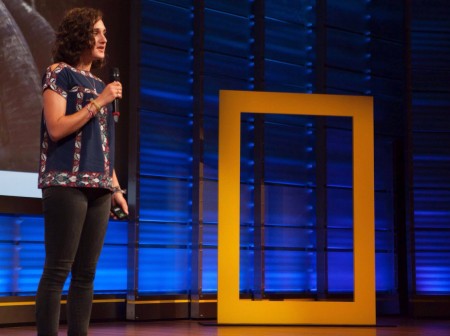
Studying the effects of climate change on coral reefs in the Caribbean was one of the projects that received funding from the National Geographic Young Explorers Grants Program. Three U of G students, now alumni, received grants to study environmental issues that are important to them. The grants are open to applicants aged 18 to 25 who are involved in research, conservation or exploration projects.
“It’s almost like an underwater rain forest,” says Ryan Eagleson, B.Sc. ’16, of the coral reefs he has seen. “I think that led me to really care about their conservation.”
He received two grants from National Geographic in 2015 and 2016 to study the impact of climate change on coral reefs off the coasts of Curacao and Bonaire, both part of the Dutch Caribbean. He started SCUBA diving in his early teens.
“We’re looking at the Mustard Hill coral,” says Eagleson. “It was doing well in areas of the coral reef that were dead or dying, so we’re trying to identify species that could do well in these conditions and see if the marine protected areas were working.” Eagleson did his undergrad with pathobiology professor John Lumsden and is now doing his master’s degree with him.
“Curacao and Bonaire are only separated by about 60 kilometres,” says Eagleson. “Bonaire has some of the best marine protection in the Western hemisphere. Curacao has almost none, so it was a really stark contrast to see the quality of the natural environment in both.”
Compared to Curacao, Bonaire has a thriving tourism and SCUBA-diving industry because of its marine protected areas, says Eagleson.
Coral reefs face a number of threats, including increased carbon dioxide in the atmosphere, which makes ocean water more acidic, he explains. Acidic water affects the coral reef’s ability to build its skeleton because it contains calcium carbonate, which dissolves in acid. Rising water temperature, over-fishing and agricultural runoff also threaten coral reefs.
Eagleson heard about the Young Explorers program through classmate Justine Ammendolia, B.Sc. ’14, who also received a grant.

The recipients were recently invited to the National Geographic Society to meet other Young Explorers and present their research findings. Meeting other recipients was a highlight for Ammendolia.
“One of the most interesting aspects of the event was the interdisciplinary nature of our projects,” says Ammendolia, now a master’s student in marine biology at Memorial University of Newfoundland. “Explorers hailed from all disciplines ranging from seabird ecology to film-making to reporting news in animal trafficking.”
She won the grant as an undergrad at U of G, where she was inspired by the Arctic research of Prof. Shoshanah Jacobs, Integrative Biology. Ammendolia decided to study Arctic seabirds in Greenland and spent a month there in the summer of 2014. She placed tracking devices on Arctic seabirds called little auks to find out what they eat, where they forage for food and how far they travel.
“We each took the personal initiative to develop our own global projects,” says Ammendolia. “From different parts of the world, we all sought out support, hoping that someone would believe in our ideas and visions — and that’s where National Geographic came into the picture.”
She plans to pursue a PhD on seabird ecology in the Arctic.
Rebecca Wolff, BAS ’15, received a grant to study spiritual beliefs about water and waterborne illness in the Peruvian Amazon. She did her fieldwork in two Shawi communities in Peru and spent two years on the project. Her work received the Award for Best Contribution to Global Health at the 2015 Canadian Conference on Global Health.

This year, she started a new project called “Environmental Disasters; Human Consequences,” a journalism and anthropology project that aims to raise awareness of the effects of three recent oil spills on indigenous communities in the Peruvian Amazon. The oil has contaminated their drinking water and the crops and rivers they rely on for food.
She co-authored a paper about her fieldwork in Peru.
“I am so grateful to have become a part of this community of explorers, storytellers and advocates who are not only doing work that is important for this planet, but are also willing to support one another in pursuing work that is inherently part of who they are,” says Wolff.